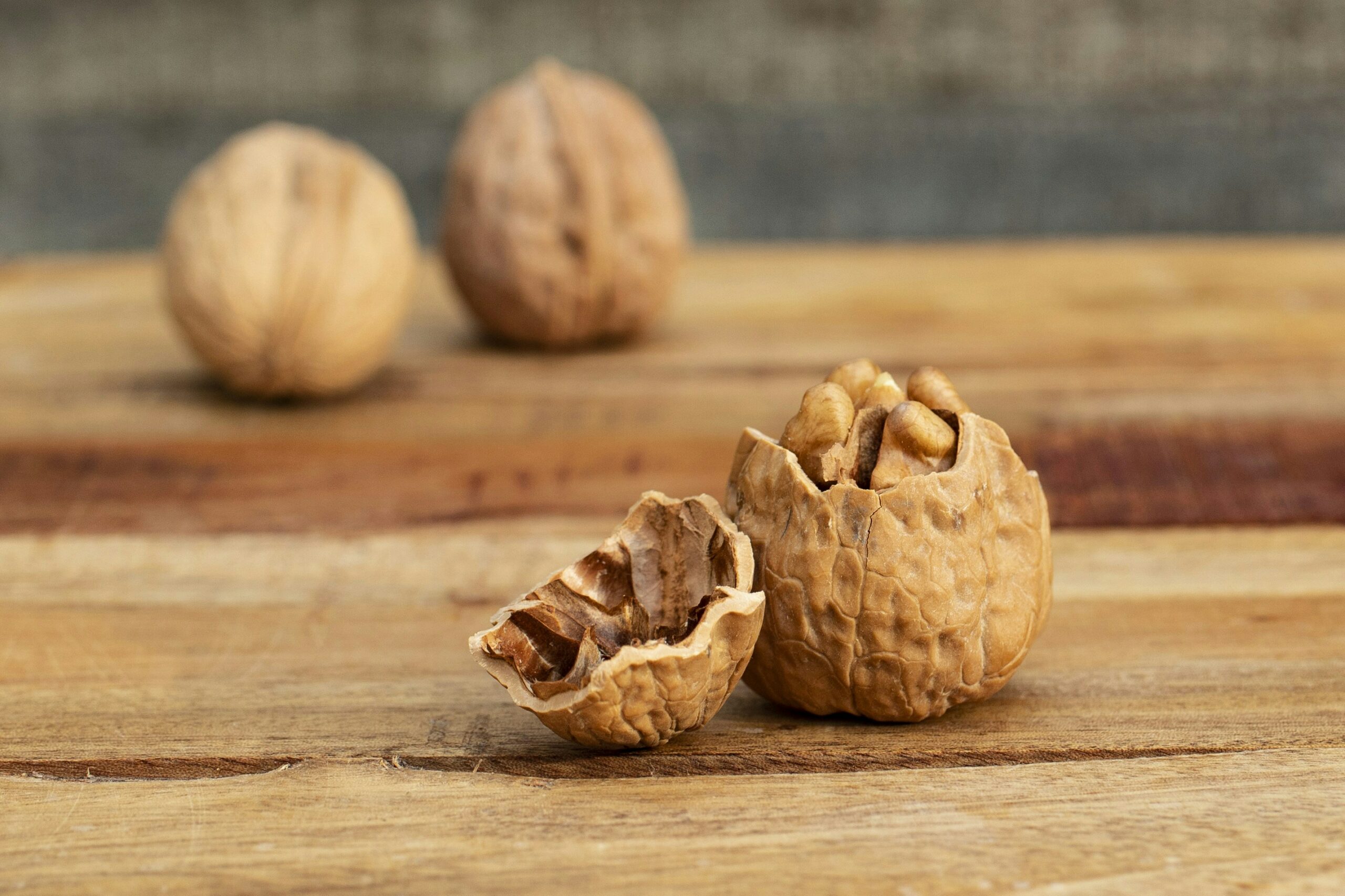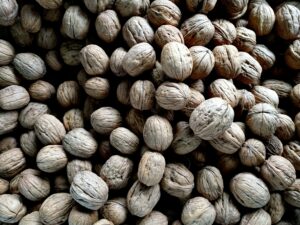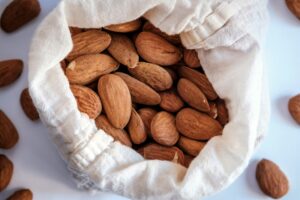Walnut Benefits Explained: What Are The Health Benefits Of Walnuts?

You may know these as an easy snack, or a crunchy topping for a cookie or salad. That’s right; I’m talking about walnuts! And there’s a lot more to these little seeds than you might think. While you might enjoy snacking on them every so often, walnuts are packed with many healthy benefits. They’re filling you up with a whole lot of nutrients that benefit all areas of your health and body.
What Are Walnuts? Where Do Walnuts Come From?

Walnuts date back to ancient Persia.
The walnut, which is, in fact, a drupe rather than a nut, originated in Persia. Being drupes, walnuts have a husk, as well as a hard outer shell. They’re great for your health, skin, and hair – even the brown seed coat (protective outer coating) of the seeds contains a lot of antioxidant properties.
There are two kinds of walnuts: the Persian walnut commonly referred to as the English walnut, and the black walnut, the latter of which originated in North America. Guess which kind is the type you buy in your supermarket? Nope, it’s not the black walnut; even though you would think so because they are native to North America.
The walnuts you see in local stores are most likely going to be the English walnut since the shells are easier to crack and they are more visually appealing. These nuts were brought to England in the Middle Ages – and thus became known as ‘English walnuts’.
A handful of walnuts a day may lower your cholesterol and protect against inflammation in your heart’s arteries. https://t.co/jUYH3eHct9 pic.twitter.com/XHrTV1j63B
— WebMD (@WebMD) November 25, 2017
Walnuts For Weight Loss & Metabolism Explained

Nuts are great for weight loss.
There’s a common misconception that nuts are not a dieter’s friend, due to their high-fat content. In reality, stay away from those sugary cakes and ice cream – but not nuts! (For the sake of using a relatable term, I am referring to walnuts as nuts, since most people don’t call them drupes.) In actuality, walnuts are beneficial to your weight loss diet.
In studies done comparing people including walnuts in their diet to people not eating walnuts, the people who included walnuts in their diet lost about 8 percent of their original weight! And this result was after eating only one-and-a-half handfuls of walnuts per day.
These particular nuts contain polyunsaturated fat, alpha-linolenic acid, or ALA for short. They are not only great for your heart, but can also stimulate weight loss. While it’s true that the calorie count is high – a quarter cup of walnuts is around 200 calories – the omega-3 fatty acids, fiber content and protein in walnuts not only help you feel less hungry for longer, but also stimulate the right insula – the part of your brain that controls the feeling of “I’m hungry and I want to eat (insert favorite food here) now!” and restrains you from giving in to temptation.
They’re a great choice for helping to keep your metabolism going because of all their essential nutrients, such as calcium, manganese, copper, iron, zinc, potassium, and selenium. So if you’re trying to lose a few pounds, eating a handful of walnuts a day is likely to help you with your goal – not go against it.
Walnuts For Heart Health Explained
You probably won’t be surprised to hear this, but walnuts are great for cardiovascular health, too.
● The antioxidants found in walnuts also make them a prime choice for keeping your heart in the best of health. They protect your heart against damage by free radicals, which can cause heart disease.
● Walnuts reduce inflammation (another cause of heart disease), and the monounsaturated and polyunsaturated fats they contain help to lower your cholesterol levels. High levels of LDL cholesterol are a common cause for heart disease since they cause plaque to build up in the arteries, which slows down the blood flow to and from the heart.
● Vitamin E is another helpful nutrient to help fight against heart disease; it too prevents plaque buildup in the arteries.
● And finally, eating walnuts can make your artery walls more flexible, which prevents blood clotting that can cause a heart attack. This is due to the L-arginine found in walnuts that your body converts into nitric oxide, which lowers your blood pressure and lets your blood flow more easily without clotting.
Many of walnut’s anti-inflammatory and antioxidant nutrients that are also beneficial for heart health. You will see these nutrients are also great for skin and hair health.
Walnuts For Skin & Hair Improvement Explained
There’s a lot of hype these days about how your diet and the ingredients in your daily beauty treatments affect the appearance of your skin and hair. Everyone wants soft, supple, youthful skin, and healthy, shiny hair – but you have to make sure that the things you eat and use on your body are helping with these goals.
Benefits for Skin

Wrinkles are a natural part of aging.
As you grow older, the appearance of wrinkles and fine lines are common annoyances. But did you know that eating walnuts can reduce wrinkles, and slow down the ageing process of your skin? (No, they can’t make you turn 21 again. But they can help you look your most youthful self!)
The Vitamin B that your body receives from eating walnuts works great at reducing stress – a common cause for early wrinkles, and also premature grey hairs. The Vitamin E, which is an antioxidant, also helps to fight against free radicals that are responsible for skin damage – which manifests itself in the form of ageing symptoms.
Even if wrinkles are not your concern, your skin can still benefit from walnuts, especially in oil form. Rubbing warm walnut oil under your eyes daily can help get rid of dark under eye circles and puffiness. It also works as a wonderful natural moisturizer, especially if you have dry skin (like me!).
This is mostly thought to be because of the linolenic acid (Vitamin F) found in walnut oil softens your skin and can help fight acne. If you have rough skin patches (like those found on your elbow), ground walnut can make your skin softer. Omega-3 fatty acids remove toxins from damaged skin cells by locking moisture from the air into your skin. This results in plumper, glowing skin.
Protein, which is essential for the healing of skin (like when you get a cut), is also found in walnuts, as are minerals like copper, zinc and iron, all of which aid in collagen production (the stuff that makes your skin healthy and flexible). Potassium, a mineral found in walnuts, is also beneficial for your skin. It helps protect your skin against problems like sagging or puffy skin and bloating.
Benefits for Hair
Healthy skin commonly goes together with healthy hair. Eating walnuts won’t just benefit your skin, it will benefit your hair as well. And when it comes to nuts and hair, walnuts are said to be the best nuts you can eat. Walnuts help keep your hair strong and healthy because they contain:
- Vitamin B7 and selenium, which fight against hair loss and keep your hair strong and healthy.
- Fatty acids and potassium, which protect your hair against sun damage, and also work to keep your scalp nourished, preventing uncomfortable dandruff.
- Essential oils, which help with blood circulation and hydration of the scalp, and figh off infections
- Keratin (an essential protein for hair) and metals like zinc and iron.
- Vitamin E, which naturally strengthens hair.
- L-arginine, which also helps to ease blood flow to hair follicles.
Walnut oil can be applied to your hair on its own, or together with other natural oils. Mixing it together with other oils can bring even better, shinier and sleeker results.
Walnuts For Male Reproductive Health Explained
Your dietary choices not only keep your body healthy and looking good, but can also affect your ability to have children. When people think of infertility, most automatically think of women – but in 40% of cases, the male is either wholly or partly responsible.
Because of the polyunsaturated fatty acids (omega-3, which is not found in any other nut), men who eat 2.5 ounces of walnuts a day have shown stronger, better formed, more mature sperm that swim better and live longer – all of which are essential for fertility.
In addition, there are loads of other nutrients in walnuts that benefit overall sperm quality. For example, lipids and folate regulate the number of chromosomes in sperm. And because walnuts contain antioxidant properties (like selenium), they protect sperm cells against free radical damage. While more research is needed on the effects of walnuts for male fertility, the research available definitely looks promising.
How To Incorporate Walnuts Into Your Diet

Walnuts go great in a green salad.
Now that you know all (or at least many) of the amazing benefits walnuts can have for your health, you might want to incorporate them into your regular diet. But how to add them to your food if you don’t have time for extra fuss?
Here are some ideas for adding walnuts into your daily meals so you can access all the nutrients they offer:
- Enjoy them as a refreshing topping to your favourite leafy-green salad.
- Throw a handful of fresh walnuts into your morning yoghurt for added taste.
- Add walnuts and a bit of cinnamon to fruit cups for a healthy, satisfying dessert.
- Sprinkle them over pasta for a fun twist to a classic recipe.
- Top your pancakes with a bit of honey and a sprinkling of walnuts.
Whether you’re eating breakfast, lunch, dinner or a snack; savory or sweet; there is a way to include walnuts! They’re versatile, ready-to-eat, and add that final ‘wow’ factor to your dish.
Conclusion
I don’t know if I convinced you to eat more walnuts with this article, but I certainly convinced myself! With all the benefits they offer, it’s a wonder more people don’t eat them often! They’re easy and can be eaten on the go, or in combination with different foods. So go out and buy yourself some walnuts! You’ll find yourself snacking less on unhealthy chips and cookies. And you will feel good knowing all the ways your body is benefiting from your small, delicious snack.



